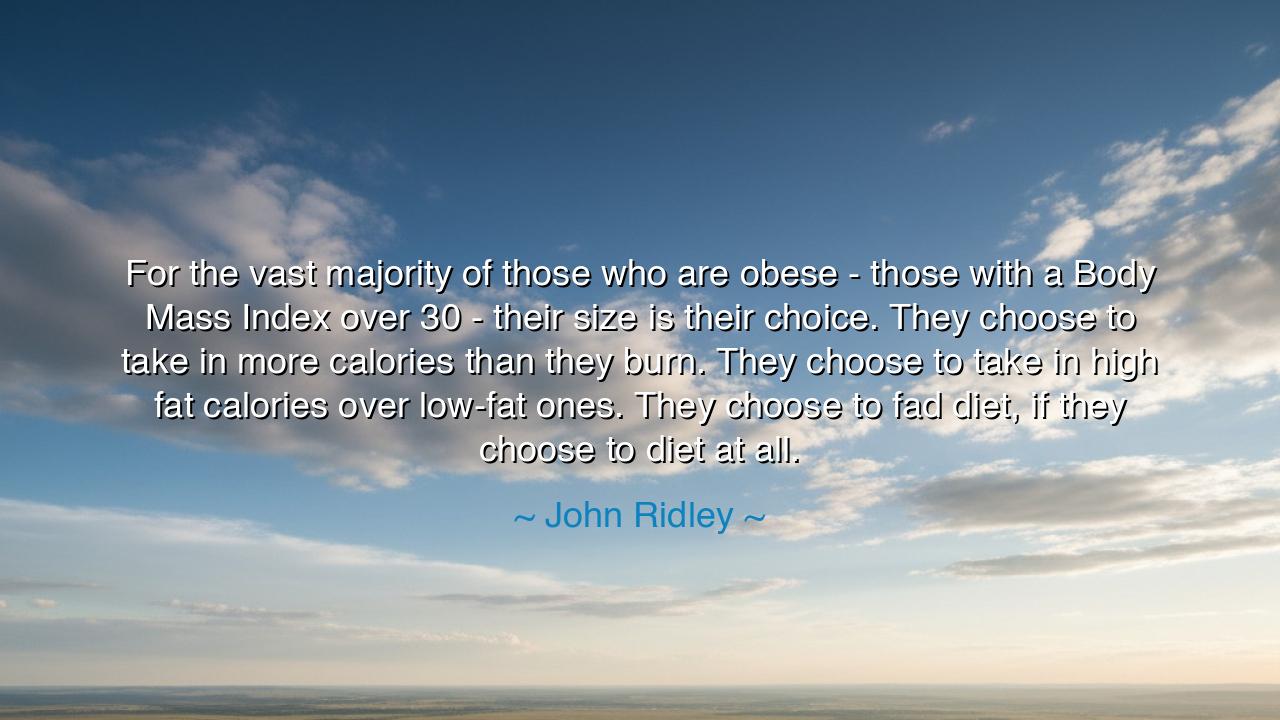
For the vast majority of those who are obese - those with a Body
For the vast majority of those who are obese - those with a Body Mass Index over 30 - their size is their choice. They choose to take in more calories than they burn. They choose to take in high fat calories over low-fat ones. They choose to fad diet, if they choose to diet at all.





The words of John Ridley strike like a hammer upon the forge of self-discipline. “For the vast majority of those who are obese... their size is their choice.” These words are not cruel; they are unyielding mirrors held to the human spirit. Ridley does not speak to condemn, but to awaken—to remind us that though fate lays the ground beneath our feet, it is choice that determines how far we walk upon it. In the age of abundance, where comfort seduces the will, he calls us back to the old truths of restraint, effort, and accountability. He speaks of a battle not waged with swords, but with spoons; not upon fields, but within the chambers of the body and soul.
In ancient times, the Stoics taught that freedom was not the absence of restraint, but the mastery of self. Epictetus, once a slave, declared that “No man is free who is not master of himself.” This is the same wisdom that flows through Ridley’s words. Obesity, as he defines it, is often not a disease of the flesh alone—it is a reflection of unmastered desire. To choose the sweet over the wholesome, the immediate pleasure over the enduring good, is to allow the senses to rule the spirit. In such a state, one may live in comfort yet die in weakness. The ancients would say: the man who cannot govern his appetite cannot hope to govern his life.
Yet, the lesson is not one of judgment—it is one of power. For if one’s size is one’s choice, then so too is one’s rebirth. History is rich with those who have reclaimed their strength from the abyss of excess. Consider the tale of King Henry VIII, whose gluttony and neglect of health left him crippled, embittered, and bound by his own body. His once-great mind, dulled by indulgence, became the very proof that kingship cannot conquer nature’s law. Contrast him with the ascetic warriors of Sparta, who saw in every meal an offering to discipline, not to pleasure. Their bodies were temples of intent, and their strength a testament to self-rule. Thus, the contrast between indulgence and mastery is as old as civilization itself.
Ridley’s invocation of choice pierces deeper than the flesh—it calls forth the eternal struggle between impulse and reason. In the modern world, where food is plentiful and motion scarce, the body has become the battlefield of moral decay. To eat without thought is to surrender to comfort’s deceitful whisper: “You deserve it.” But what we deserve, truly, is not ease—it is dignity. The dignity that comes from the will refined by hardship, the heart trained by self-denial, the mind awakened by discipline. The body, when governed, becomes not a prison but a vessel for greatness.
In these words also lies a warning: that excuses are the chains of the weak. Many cry out to circumstance, to metabolism, to fate—but the wise know that while fate may deal the cards, choice plays the hand. To believe otherwise is to surrender the throne of one’s life to shadows. Those who justify their decline by blaming destiny abandon the very gift that makes them human—the capacity to choose transformation. Even a small choice—one step walked, one sweet refused, one dawn risen early—kindles the divine fire of self-command.
Let us then remember the story of Mahatma Gandhi, a man of frail body but iron will. Through fasting, he proved that the spirit rules the flesh, not the other way around. His strength was not born of meat and bread, but of conviction. He taught that mastery of one’s appetite is mastery of one’s destiny. To the modern soul lost in consumption, this is the same lesson Ridley revives: that the measure of a person is not how much they consume, but how much they can restrain.
So, what lesson shall we take from these words? It is this: that discipline is freedom, and choice is power. To eat wisely, to move with purpose, to live in awareness—these are acts of sacred defiance against decay. The ancients built temples to the gods; we must build temples of flesh and will, carved by our own restraint. Every morsel refused in wisdom is a victory. Every sweat-born breath is an offering to the self that could be.
Let the generations to come know that comfort, though sweet, is a silent destroyer. Choose strength over sloth, vitality over indulgence, and mastery over excuse. For the gods of health and honor do not demand perfection—they demand effort, renewed each dawn. And in that daily struggle, the mortal becomes immortal—not through what he eats, but through what he chooses to become.






AAdministratorAdministrator
Welcome, honored guests. Please leave a comment, we will respond soon